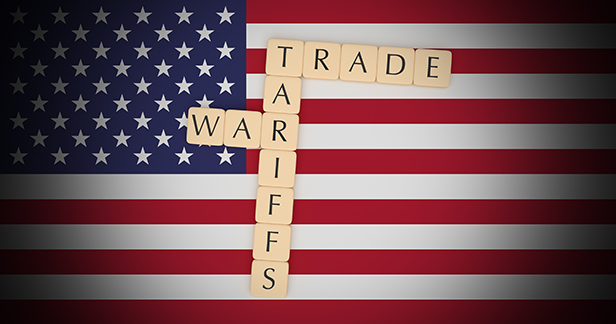November 18, 2019
Report: China Pessimistic About ‘Phase One’ Trade Deal
The trade war, with its impact on the promotional products industry, appears poised to continue without a preliminary agreement, recent reports indicate.
Last month, when President Donald Trump proclaimed that a “Phase One” trade deal between the United States and China was essentially all but in place, leaders in the promotional products industry cautioned against getting too excited before an actual agreement was signed.
It appears now that the leeriness might have been well-warranted.

Reported developments over the last few days suggest that the prospect of the deal being signed is diminishing – news that comes with implications for U.S. promo product companies, which import most of the products they sell here from China.
The latest evidence of mounting roadblocks to a Phase One deal came from Beijing. CNBC’s Eunice Yoon reported that a Chinese government source said that China officials are pessimistic about the deal getting done in the wake of recent comments from Trump in which the president said he has not agreed to rollback U.S. tariffs on Chinese imports. Beijing was under the impression that a scale-down in the approximately $360 billion in import duties would be part of a Phase One agreement, Yoon reported.
Mood in Beijing about #trade deal is pessimistic, government source tells me. #China troubled after Trump said no tariff rollback. (China thought both had agreed in principle.) Strategy now to talk but wait due to impeachment, US election. Also prioritize China economic support.
— Eunice Yoon (@onlyyoontv) November 18, 2019
The political situation in America is also reportedly eroding the chances of a deal being signed. The Chinese government source told Yoon that Beijing is closely monitoring the impeachment probe against Trump, weighing whether it would make more sense to see how things play out before committing to any type of new trade deal.
Some top executives in the promotional products industry are increasingly skeptical that a trade deal – even a limited one – is going to be reached any time soon between the world’s two largest national economies. “The Trump administration is genuinely hopeful that they’ll get a ‘Phase One’ deal done, and the Chinese are hopeful that they can get a rollback on tariffs, but I’m deeply skeptical that the Chinese will agree to anything with any teeth to it,” Joshua White, general counsel and senior vice president of strategic partnerships at Top 40 distributor BAMKO (asi/131431), told Counselor. Based in Los Angles with a global reach, BAMKO has operations in Asia, the Americas and beyond. “There are many hurdles that need to be cleared,” White continued. “The more I dig into this subject, the more convinced I am that things are not going to go well.”
The trade war has been going on for about two years now. Part of the conflict was premised on Trump’s intention to correct what the U.S. side has characterized as long-running unfair trade practices by China, including the forced transfer of technology and other intellectual property theft against foreign companies wishing to do business in the nation. While China has made pledges on IP protection, negotiators remain stuck on how to properly enforce such safeguards, among other issues that complicate the picture already clouded by tariff disagreements. “So far this trade war has accomplished nothing aside from breaking up U.S. supply chains and souring relations between the U.S. and China,” Linette Lopez, a Business Insider columnist, wrote in a Nov. 17 opinion piece.
It's never good when you're fighting hard for status quo antebellum. https://t.co/9FKrmtA1ly
— Linette Lopez (@lopezlinette) November 17, 2019
Promotional products companies can identify with Lopez’s supply chain comments. One of the repercussions of the trade war is that it has accelerated – and, in cases, instigated – promo firms to shift at least some sourcing to countries outside of China. “We’ve moved stuff to Vietnam, and none of it is going to ever come back to China – ever,” White said. The supply chain shifting, which can be complicated and lengthy, has some ad specialty executives worried that product safety and corporate social responsibility issues could arise in the rush to diversify geographically. “For (companies) that do not have the people and processes to verify, this could increase the risk to the industry around compliance-related problems,” Jonathan Isaacson, CEO of Top 40 supplier Gemline (asi/56070), has told Counselor.
The trade war has also triggered price increases on promo products affected by import tariffs. More price increases likely lie ahead as suppliers replenish stock with goods brought stateside under escalated tariffs put in place in the spring and additional levies implemented in September. Affected products run the gamut, from a spectrum of apparel pieces that include T-shirts, to technology accessories, drinkware, headwear, bags and more. If Trump proceeds with a plan to levy additional duties on more imports on Dec. 15, essentially everything the U.S. imports from China will be subject to tariffs – a situation likely to propel future price increases in promo.
The trade war has also introduced greater uncertainty to the marketplace. While promo companies have continued to produce sales gains, on average, this year, many worry that the broader economic uncertainty could eventually compel end-clients to restrict their spending on branded merchandise. “The ground is constantly shifting, and it’s impossible to predict where this is headed,” David Nicholson, president of Top 40 supplier Polyconcept North America (asi/78897), recently told Counselor.
